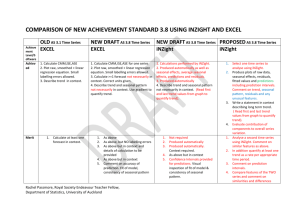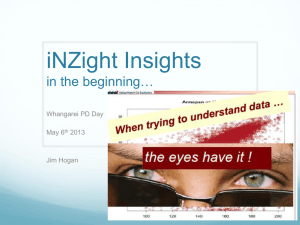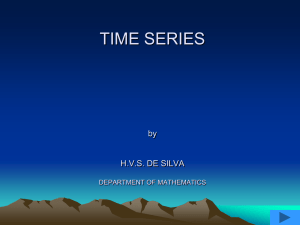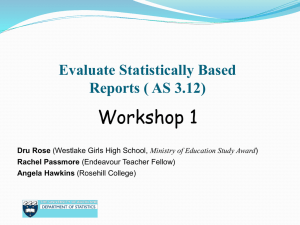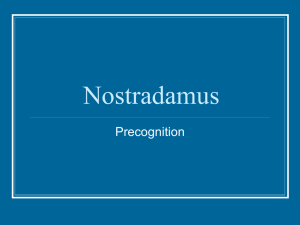Time Series Presentation at AMA
advertisement
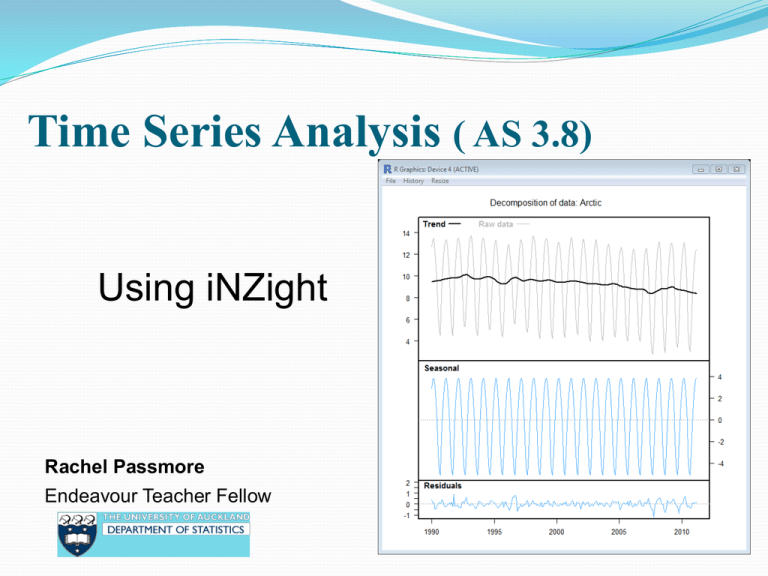
Time Series Analysis ( AS 3.8) Using iNZight Rachel Passmore Endeavour Teacher Fellow Overview Statistics : What has changed Changes from AS 3.1 to draft AS 3.8 iNZight – what is it ? How do I get it? How do I use it? Data for iNZight Time Series Analysis using iNZight Seasonal Lowess & Holt-Winters models Summary of Resources Feedback on AS 3.8 changes Rachel Passmore Old AS 3.1 vs Draft AS 3.8 AS 3.1 DRAFT AS 3.8 Using EXCEL Using EXCEL 1. Calculate smoothed, ISE,ASE. Fit linear regression to smoothed series 2. Time series plot 3. Describe trend in context. 1. 2. 3. 4. Merit Level 1. Calculate one prediction in context . 1. Comment on accuracy of prediction. Excellence Level 1. Comment on 2 further features. 2. Comment on 3 items from list of 5. 1. Comment on further features as before – NEW other relevant variables, or deeper understanding Achieved Level Rachel Passmore NO CHANGE NO CHANGE NO CHANGE Describe trend AND seasonal pattern – not necessarily in context 5. Calculate one prediction. Draft AS 3.8 Time Series Achieved Level Draft AS 3.8 DRAFT AS 3.8 Using EXCEL Using iNZight 1. 2. 1. Calculations performed by iNZight. 2. Produced automatically as well as seasonal effects, average seasonal effects, predictions and residuals. 3. Produced automatically 4. Describe trend and seasonal pattern not necessarily in context. (Use first and last trend values to quantify trend). 3. 4. Calculate CMM,ISE,ASE for one series Plot raw, smoothed + linear regression equation. Calculate >= 1 forecast Describe trend and seasonal pattern, not necessarily in context. Use gradient to quantify trend Merit Level 1. to 4. As above but no labelling errors on plots and details of calculations required. Context of forecast required. 5. Comment on accuracy of predictions 1. 2. 3. 4. 5. Excellence Level 1. Comment on accuracy of predictions, unusual features, improvements, other relevant variables or demonstrate deeper understanding of series/model. No indication provided on how many required for Excellence 1. iNZight provides much greater potential at Excellence level. Residual analysis, comparison with other series, comparison with computed series ( differences, sums or ratios of series) Rachel Passmore Not required Produced automatically Produced automatically. Context required. As above but in context Prediction Intervals provided. Visual inspection of fit of model & consistency of seasonal pattern. What is iNZight ? Data analysis and inference tool developed by University of Auckland Statistics Department FREE – download from Census@School OR http://www.stat.auckland.ac.nz/~wild/iNZight/dlw.html Versions available for Windows, Mac & Linux Useful for AS – 3.8,3.9,3.10, 3.11 & at Level 1 & 2 NEW module – Time Series Rachel Passmore Data files for iNZight • • • • • • • Software download includes some data sets Polar ice & Food for thought – current NZQA exemplars Statistics NZ – currently compiling 15 – 20 series for schools Series from University of Auckland Time series course Rob Hyndman’s Time Series Data Library http://datamarket.com/data/list/?q=provider:tsdl Infoshare – new data service from Statistics NZ Format of Data files • • • • EXCEL files OK if saved with .csv (comma delimited) file extension Time & variable notation protocol NO COMMAS Additional information about variables including units must be provided separately Rachel Passmore Examples of analysis Rachel Passmore Summary of iNZight features for time series analysis Shift from emphasis on calculations to visual interpretation Potential to compare differences & similarities between series Potential to compute further series – sum, difference, ratio ……or other transformation Use of Seasonal Lowess for smoothing & Holt-Winters for predictions BUT draft new AS 3.8 does not currently accommodate all iNZight features. Rachel Passmore Seasonal Lowess Model iNZight uses Seasonal Lowess Model to produce smoothed values A weighted least squares regression line is fitted to points inside the window The point at the target X value becomes the Smoothed value. Smaller weights at edge of window Rachel Passmore window xtarget Holt Winters prediction model First developed in early 1960s Uses a technique called EXPONENTIAL SMOOTHING Assumes next value is weighted sum of previous values Weights decrease by a constant ratio and if plotted will lie on exponential curve. Holt-Winters smooths level, trend and seasonal sub-series to produce prediction. Additive Model Rachel Passmore Comparison of Prediction Models Series Series description Trend + ASE Comparison with Holt-Winters Constant linear trend + consistent seasonal pattern Trend extrapolation, ASEs calculated, reasonable predictions Little difference if any in either fitted values or predictions Non-linear trend + consistent seasonal pattern Achieved /Merit – linear trend fitted, predictions poor. Excellence – consider piece-wise or non-linear models. Predictions could still be poor. Copes well with nonlinear trend resulting in improved predictions Non-linear trend and inconsistent seasonal pattern Excellence – may consider multiplicative models but not expected to provide equations Excellence – consider multiplicative model but option not available on iNZight. Rachel Passmore BUT…………………….. • Holt Winters additive model only valid for consistent seasonal pattern. If seasonal pattern varies a HoltWinters multiplicative model should be used or series transformed. • Option for multiplicative model not available. • Default setting of two years predictions provided on plot. • Table of prediction values & intervals need to rounded appropriately Rachel Passmore SUMMARY OF RESOURCES iNZight Time series module – AVAILABLE NOW Datasets in correct format – some available now, more on the way ! - Census@School website iNZight data file tips – Census@School website Teacher’s guide to Seasonal Lowess & Holt-Winters model – Census@School Document tracking changes from 3.1 through to 3.8 using iNZight – to be uploaded on Census@School website Worked exemplars using iNZight – Polar Ice & Food for Thought- Census@School website Audio demo on iNZight available – time series one soon (http://www.stat.auckland.ac.nz/~wild/iNZight/) Rachel Passmore Rachel Passmore Contact Details Home email : passm@vodafone.co.nz ANY QUESTIONS ? COMMENTS WELCOMED ! With thanks to University of Auckland Statistics Department ( Chris Wild, Mike Forster and Maxine Pfannkuch), Teachers Ruth Kaniuk,Dru Rose & Rebecca Fowler and New Zealand Science, Mathematics and Technology Teacher Fellowship Scheme. Rachel Passmore
